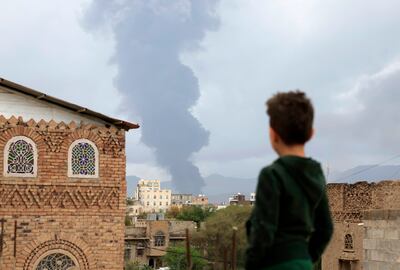At least 10 people were killed and 92 injured in Israeli air strikes on the Yemeni capital Sanaa on Sunday, the Houthi rebels' Health Ministry said.
The Israeli army said it struck military infrastructure of the Houthis in Sanaa, two days after the militants fired a missile towards Israel.
The army said that the targets included a military site in which the presidential palace is located, the Asar and Hizaz power plants, and a site for storing fuel.
“The strikes were conducted in response to repeated attacks by the Houthi terrorist regime against the State of Israel and its civilians, including the launching of surface-to-surface missiles and UAVs towards Israeli territory in recent days,” the army said.
The Houthi-run Al Masirah TV reported “the Israeli aggression targeted with several strikes the oil company on 60th Street in the capital Sanaa and Hezyaz power station in southern Sanaa”.
Member of the Houthi political bureau Mohammed Al Frah described in a post on X the strikes as “desperate”, saying that Israel “targets civilian facilities that have no military connection, deliberately harming civilians, as it does in Gaza”.
The attacks are the first to hit the rebel-held Sanaa since August 17, when Israel said it attacked energy infrastructure it believed was used by the rebels.
On Friday, the Houthis said they had fired a ballistic missile towards Israel. An Israeli Air Force official said on Sunday the missile most likely carried several sub-munitions “intended to be detonated upon impact”.
“This is the first time that this kind of missile has been launched from Yemen,” the official said.
Since Israel's war in Gaza against the Palestinian militant group Hamas began in October 2023, the Iran-aligned Houthis have attacked vessels in the Red Sea in what they describe as acts of solidarity with the Palestinians.
They have also frequently fired missiles towards Israel, most of which have been intercepted. Israel has responded with strikes on Houthi-controlled areas, including the vital Hodeidah port.
Milestones on the road to union
1970
October 26: Bahrain withdraws from a proposal to create a federation of nine with the seven Trucial States and Qatar.
December: Ahmed Al Suwaidi visits New York to discuss potential UN membership.
1971
March 1: Alex Douglas Hume, Conservative foreign secretary confirms that Britain will leave the Gulf and “strongly supports” the creation of a Union of Arab Emirates.
July 12: Historic meeting at which Sheikh Zayed and Sheikh Rashid make a binding agreement to create what will become the UAE.
July 18: It is announced that the UAE will be formed from six emirates, with a proposed constitution signed. RAK is not yet part of the agreement.
August 6: The fifth anniversary of Sheikh Zayed becoming Ruler of Abu Dhabi, with official celebrations deferred until later in the year.
August 15: Bahrain becomes independent.
September 3: Qatar becomes independent.
November 23-25: Meeting with Sheikh Zayed and Sheikh Rashid and senior British officials to fix December 2 as date of creation of the UAE.
November 29: At 5.30pm Iranian forces seize the Greater and Lesser Tunbs by force.
November 30: Despite a power sharing agreement, Tehran takes full control of Abu Musa.
November 31: UK officials visit all six participating Emirates to formally end the Trucial States treaties
December 2: 11am, Dubai. New Supreme Council formally elects Sheikh Zayed as President. Treaty of Friendship signed with the UK. 11.30am. Flag raising ceremony at Union House and Al Manhal Palace in Abu Dhabi witnessed by Sheikh Khalifa, then Crown Prince of Abu Dhabi.
December 6: Arab League formally admits the UAE. The first British Ambassador presents his credentials to Sheikh Zayed.
December 9: UAE joins the United Nations.
Points to remember
- Debate the issue, don't attack the person
- Build the relationship and dialogue by seeking to find common ground
- Express passion for the issue but be aware of when you're losing control or when there's anger. If there is, pause and take some time out.
- Listen actively without interrupting
- Avoid assumptions, seek understanding, ask questions
MATCH INFO
Fixture: Ukraine v Portugal, Monday, 10.45pm (UAE)
TV: BeIN Sports
Guide to intelligent investing
Investing success often hinges on discipline and perspective. As markets fluctuate, remember these guiding principles:
- Stay invested: Time in the market, not timing the market, is critical to long-term gains.
- Rational thinking: Breathe and avoid emotional decision-making; let logic and planning guide your actions.
- Strategic patience: Understand why you’re investing and allow time for your strategies to unfold.
The%20specs
%3Cp%3E%3Cstrong%3EPowertrain%3A%20%3C%2Fstrong%3ESingle%20electric%20motor%0D%3Cbr%3E%3Cstrong%3EPower%3A%20%3C%2Fstrong%3E201hp%0D%3Cbr%3E%3Cstrong%3ETorque%3A%20%3C%2Fstrong%3E310Nm%0D%3Cbr%3E%3Cstrong%3ETransmission%3A%20%3C%2Fstrong%3ESingle-speed%20auto%0D%3Cbr%3E%3Cstrong%3EBattery%3A%20%3C%2Fstrong%3E53kWh%20lithium-ion%20battery%20pack%20(GS%20base%20model)%3B%2070kWh%20battery%20pack%20(GF)%0D%3Cbr%3E%3Cstrong%3ETouring%20range%3A%20%3C%2Fstrong%3E350km%20(GS)%3B%20480km%20(GF)%0D%3Cbr%3E%3Cstrong%3EPrice%3A%20%3C%2Fstrong%3EFrom%20Dh129%2C900%20(GS)%3B%20Dh149%2C000%20(GF)%0D%3Cbr%3E%3Cstrong%3EOn%20sale%3A%3C%2Fstrong%3E%20Now%3C%2Fp%3E%0A


